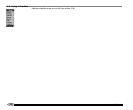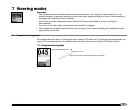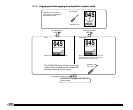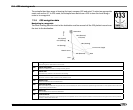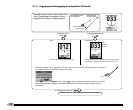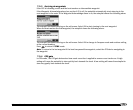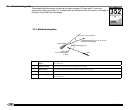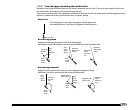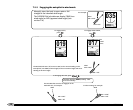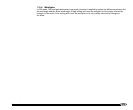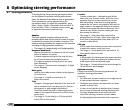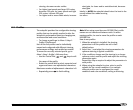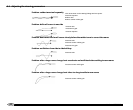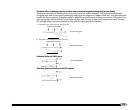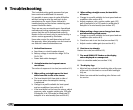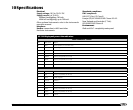
40
Northstar NS3300 Pilot
The autopilot has seven steering parameters which
can be adjusted to optimize steering performance.
Select the Advanced checkbox to view all parameters.
These parameters can be adjusted using the
Parameters menu. To adjust the parameters, go to
Menu > Setup > Profiles > Parameters (see section 6-2).
From the Basic, Pilot or Compass screens, press
to open the Parameters menu directly.
Adaptive
This is an adaptive response setting where the
autopilot adjusts how far the boat can move off course
to maintain a constant rate of rudder corrections. The
adaptive setting eliminates the need to set the response
according to varying weather conditions.
• The range is A1 (adapts slowly) to A5 (adapts quickly).
Response (dead band)
How far the boat will be allowed to fall off course
before it makes a correction.
A lowest response setting lets the boat fall very
far off course before the autopilot corrects.
The highest response setting corrects for every
boat movement
• The range is 1 (broad course keeping) to 10 (tight
course keeping).
Ratio (gain)
How far the rudder moves relative to the degrees
of course error
• The range is 1 (small corrections) to 10
(large corrections).
Trim
Trim gain -(Integral gain) Watches if the boat is off
course consistently in one direction (Ex. Due to a
strong wind, or poor weight distribution ).
Trim Gain causes the pilot to slowly apply extra
rudder in the opposite direction to correct for the
course error.
• The range is 1 (trim slowly) to 10 (trim quickly)
and 0 (OFF no trim effect).
C-rudder
Counter rudder gain – (derivative gain) At the
end of the turn, counter rudder will steer in the
opposite direction to help stop the turn at the
desired heading. If the boat is turning quickly
towards the set course, the autopilot with start to
apply rudder in the opposite direction to prevent
to boat steering past the desired direction, this is
called counter rudder. Counter rudder gain sets
how strong this effect is.
• The range is 1 (low: Most often used with a
plaining boat) to 10 (high : Most often used with
a sail boat or displacement boat) and 0 (OFF no
counter rudder effect).
GPS gain
In GPS mode, this determines how much correction
is applied to remove cross track error.
• The range is 1 (steer gently back on track) to 10
(steer quickly back on track).
Wind gain
In wind mode, this determines how much correction
is applied to reduce any difference between the set
wind angle and the actual wind angle.
• The range is 1 (slowly affected by wind change) to
10 (sensitive to wind change).
Optimum steering
Change the values of the steering parameters for
optimum steering performance.
Generally:
• For calm seas, increase response; for rough seas (or
to save power) decrease response.
• For higher boat speeds, decrease ratio; for lower
speeds, increase ratio.
• In case of cross-winds or weather-helm, increase
trim; In case of balanced steering, decrease trim.
• For large displacement boats and boats with
insensitive steering, increase counter rudder;
for lightweight boats and boats with responsive
8 Optimizing steering performance
8-1 Steering parameters



